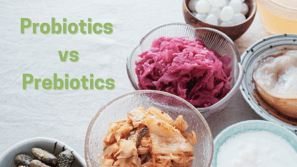 You may have noticed the refrigerated section of endcaps expanding in recent years as more and more options for items like kombucha, kefir, wellness shots, and tonic drinks. Many of these products are sources of probiotic and prebiotics. But why are they so popular and what health benefits do they really offer?
You may have noticed the refrigerated section of endcaps expanding in recent years as more and more options for items like kombucha, kefir, wellness shots, and tonic drinks. Many of these products are sources of probiotic and prebiotics. But why are they so popular and what health benefits do they really offer?
Probiotics are incredibly important to our gut, overall digestive systems, and holistic health. There is an entire living ecosystem within our digestive organs that helps our body function, even our nervous system.
We have been aware of them for about 150 years, but scientists started studying them more deeply in the 1990’s and in the past 30 years we’ve learned more about their benefits. However, even though the science is recent, people have been intuitively consuming probiotics for most of our history.
What are Probiotics?
Probiotics are live microorganisms that support the life of healthy bacteria in the gut to aid in digestion and overall health. Healthy bacteria in the gut are also known as microflora.
What are Prebiotics?
Prebiotics are what feed probiotics. They are a source of high fiber that feeds the microflora of bacteria in the gut.
Benefits
The more we explore nutritional sciences the more we find evidence that diet and a healthy gut biome are key components in overall human health. It can impact our emotional health and regulate our hormones as well as allow us to digest our food properly and efficiently.
There was a small study in 2017 that pointed to a strong link between our gut and brain health by showing a correlation between probiotics and alleviating symptoms of depression. Researchers have also seen how introducing probiotics into the diet of people with irritable bowel syndrome (IBS) improved symptoms.
A healthy gut protects your digestive heath and how well you absorb nutrients to your body. It supports your immune system by forming short-chain fatty acids which feed the cells lining your colon and keeps out viruses and unhealthy bacteria. It can also help reduce inflammation and reduce the risk of cancer.
In a very basic explanation –humans need to eat food to live, the probiotics in our gut help us digest the food, and prebiotics feed the probiotics.
Probiotic Sources
Mankind has been consuming probiotics since we started fermenting food and drink. There is a form of fermented food in almost every culture in the world. Some of the oldest sources of probiotics in our diets are yogurt, certain cheeses, sauerkraut, and kimchi. Presently, we also have probiotic drinks like kombucha and kefir that have been commercially available in recent years, though they are not a new discovery.
A note about eating fermented foods for probiotic benefit; you need to make sure they aren’t pasteurized because that process will kill the probiotic bacteria. There are also only certain kinds of pickles that are fermented, though they are found in a brine like sauerkraut.
Prebiotic Sources
Prebiotics are present in high fiber foods like fruits, vegetables, and whole grains. You need the fiber to feed the probiotics because they can digest fiber our bodies can’t. Like probiotics have kombucha, there are some prebiotic drinks that have fiber in them to feed your microflora.
The sources of fiber can be soluble -think Metamucil or liquid fiber sources - or insoluble, think mini wheats cereal. Some examples of food sources to get prebiotics includes, legumes like beans and peas, berries, garlic, onions, leeks, and oats.
Supplements
If getting enough fermented foods or fibrous foods in your regular diet isn’t an option, supplements can help. However, there are some factors to be aware of:
- Some products will claim to be probiotic but have no proof of working so you need to be sure to choose a reliable and proven brand.
- If you don’t have any prebiotic fiber in your system, the probiotics will have nothing to feed on and wont’ be effective.
- Probiotic supplements can have adverse reactions to certain people and shouldn’t be taken.
- Before starting a supplement, you should always check with a healthcare professional.
The Good News About Prebiotics and Probiotics
Our bodies are great at telling us what they need if we listen to them. By incorporating probiotics in the form of fermented foods or supplements, whatever works best for your lifestyle, and feeding them with fibrous foods, you can improve your overall health. You’ll probably feel it in your gut! Just avoid high sugar and fatty foods as they can hinder the growth and life of your digestive system’s microflora.
Probiotics and prebiotics are only a small part of your overall health. If you’re looking at the new year and want to make sure you start off as healthy as possible, you can speak with a medical professional at our Medical Specialty Center to help you understand any changes you need to make.



